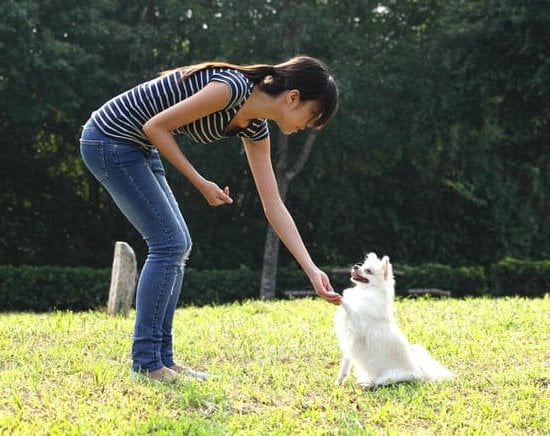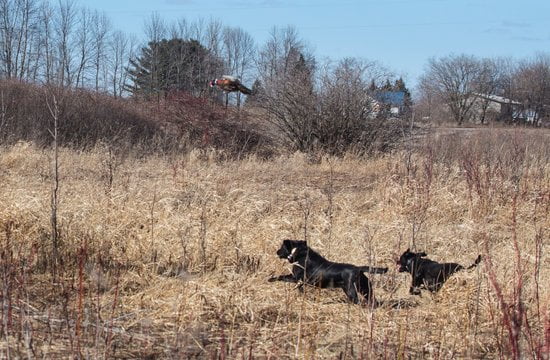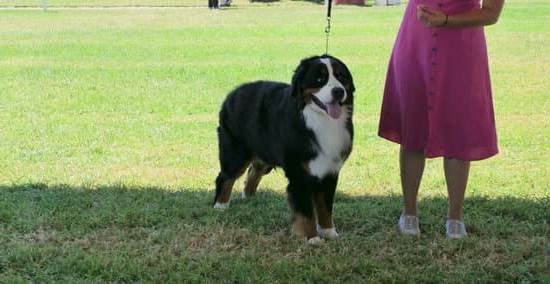Training a dog is a rewarding experience that strengthens the bond between pet and owner. Many may wonder, can you train a dog at any age? The answer is yes, regardless of whether your furry friend is a playful puppy or a wise old canine companion.
Training dogs at any age is crucial for their well-being and overall behavior. In this article, we will delve into the significance of training dogs at different stages of their lives, from the benefits of starting early to the challenges and techniques of training older dogs.
Starting training at a young age sets a solid foundation for your dog’s behavior and skills. Puppies are like sponges, eager to learn and please their owners. Early training helps them develop good habits, socialize effectively, and prevent future behavioral issues. On the other hand, older dogs may present unique challenges due to ingrained behaviors or health conditions. However, it is never too late to teach an old dog new tricks with patience, consistency, and tailored training methods.
It’s important to debunk the myth that older dogs cannot be trained effectively. With the right approach and understanding of their needs, older dogs can still learn and adapt. From positive reinforcement to understanding their limitations, there are various techniques that can help in training older dogs successfully.
Regardless of age, every dog deserves the opportunity to learn and grow through training. Through this article, we aim to provide insights into the importance of training dogs at any age and how it can greatly benefit both pets and owners alike.
Benefits of Training Dogs at a Young Age
Training dogs at a young age is crucial in shaping their behavior and development. Starting training early sets a solid foundation for good behavior, socialization, and obedience. Here are some benefits of training dogs at a young age:
- Establishing good habits: Young dogs are like sponges, eager to learn and please their owners. By starting training early, you can instill good habits such as potty training, basic commands, and proper leash walking.
- Bonding with your pet: Training provides an opportunity for bonding between you and your dog. It creates trust, communication, and strengthens the relationship between the two of you.
- Preventing behavior issues: Addressing behavioral problems early on can prevent future issues that may arise as the dog grows older. Teaching proper manners and socialization can help avoid aggression, anxiety, or other unwanted behaviors.
It is often said that “you can’t teach an old dog new tricks,” but in reality, dogs of any age can learn and benefit from training. While there may be some challenges when training older dogs, it is definitely possible to teach them new behaviors and commands.
Challenges of Training Older Dogs
- Set in their ways: Older dogs may have established habits or behaviors that are harder to change compared to younger dogs.
- Possible health issues: Senior dogs might have physical limitations or health conditions that could impact their ability to learn new things.
- Past experiences: Older dogs may have had negative experiences or lack of socialization which can make training more challenging.
Despite these challenges, with patience, consistency, and using the right techniques, older dogs can still learn new behaviors and tricks. It’s important to tailor the training methods to suit the individual needs and abilities of the older dog while keeping in mind their physical health and mental well-being.
Challenges of Training Older Dogs
As a dog owner, you may wonder, “Can you train a dog at any age?” The answer is yes. Training a dog at any age is not only possible but also beneficial for their overall well-being and your relationship with them. However, when it comes to training older dogs, there are some challenges that might arise. Addressing these common difficulties can help make the training process smoother and more effective.
One of the primary challenges of training older dogs is breaking old habits that they have developed over the years. Unlike puppies who are more adaptable to new routines, older dogs may be set in their ways and resistant to change. This can make it challenging to introduce them to new commands or behaviors. Patience, consistency, and positive reinforcement are key when working with an older dog to undo undesirable habits.
Another challenge when training older dogs is dealing with health issues or physical limitations that come with age. Arthritis, hearing loss, or vision problems can affect an older dog’s ability to learn new commands or respond to training techniques.
It’s essential to take your senior dog’s health into consideration and adapt your training methods accordingly. Consulting with a vet before implementing any training program can ensure that you’re not pushing your furry friend beyond their physical capabilities.
Training an older dog requires understanding and empathy. While it may present unique challenges compared to training a young puppy, it’s still entirely possible to teach an old dog new tricks with patience, dedication, and the right approach. By addressing common difficulties faced when training older dogs and tailoring your methods to suit their needs, you can help your senior canine companion stay mentally sharp, engaged, and well-behaved for years to come.
| Challenges of Training Older Dogs | Addressing Common Difficulties When Training Older Dogs |
|---|---|
| Breaking old habits | Older dogs may be resistant to change due to established routines. |
| Health issues | Physical limitations such as arthritis or sensory impairments can impact learning capabilities. |
| Patient approach | Training an older dog requires empathy, patience, and understanding. |
Can You Teach an Old Dog New Tricks?
When it comes to training dogs, one common question that often arises is: can you teach an old dog new tricks? The answer to this age-old question is a resounding yes. Dogs of any age have the ability to learn and adapt, making it possible to train them no matter how old they may be.
While it may require a bit more patience and persistence when working with older dogs, the process can be just as rewarding as training a puppy. Here are some key points to consider when training older dogs:
- Patience is Key: Older dogs may not pick up commands as quickly as younger pups, so it’s important to be patient and consistent in your training efforts.
- Use Positive Reinforcement: Rewarding good behavior with treats, praise, or playtime can help motivate older dogs to learn new tricks and behaviors.
- Keep Training Sessions Short and Engaging: Older dogs may tire more easily, so keeping training sessions short (around 10-15 minutes) and engaging can help maintain their focus and interest.
It’s also important to take into consideration the individual needs of your dog when training them at an older age. Some older dogs may have physical limitations or health issues that could impact their ability to learn new tricks.
In these cases, it’s important to work closely with your veterinarian or a professional dog trainer to develop a training plan that takes into account your dog’s age and health status. With the right approach and dedication, older dogs can continue to learn and grow throughout their lives.
Techniques for Training Older Dogs
Patience and Consistency
Training an older dog requires patience and consistency. It may take longer for them to learn new commands or behaviors compared to younger dogs. It’s important to be patient and continue reinforcing training sessions regularly. Consistency is key in helping older dogs understand what is expected of them. By using the same cues and rewards consistently, older dogs can gradually learn and retain new information.
Positive Reinforcement
Using positive reinforcement techniques is crucial when training older dogs. Rewarding good behavior with treats, praise, or playtime can motivate them to continue learning. Older dogs may respond better to positive feedback and rewards, so incorporating this into training sessions can make the process more enjoyable for both the dog and the owner. Avoid using punishment or harsh methods, as they can cause stress and confusion in older dogs.
Adjusting Training Methods
It’s important to adapt training methods to suit the individual needs of older dogs. Consider their physical capabilities, health conditions, and cognitive abilities when designing a training program.
Break down tasks into smaller steps, use visual cues or hand signals if necessary, and provide plenty of encouragement throughout the process. Tailoring training exercises to accommodate an older dog’s specific requirements
Socialization
Socializing dogs is a crucial aspect of their training, regardless of their age. Proper socialization can you train a dog at any age help them become well-adjusted, confident, and happy pets. It involves exposing them to different environments, people, animals, and situations in a positive way. Socialization plays a significant role in shaping a dog’s behavior and temperament, making it an essential component of their overall training.
The Importance of Socialization for Puppies
Puppies are like sponges when it comes to learning and adapting to new experiences. Introducing them to various stimuli from an early age can you train a dog at any age help prevent behavioral issues such as fearfulness or aggression later on.
Puppy socialization classes are an excellent way for young dogs to interact with other puppies under controlled settings, helping them develop important social skills. Exposing puppies to different sights, sounds, smells, and textures during the critical socialization period (typically between 3 weeks to 14 weeks) sets the foundation for well-rounded adult dogs.
Socialization for Adult and Senior Dogs
While socializing adult and senior dogs may present some challenges compared to puppies, it is never too late to start. Older dogs can you train a dog at any age benefit from positive exposure to new people, places, and experiences just like younger dogs do.
Slowly introducing them to novel stimuli in a controlled manner can help reduce anxiety or reactivity in unfamiliar situations. Whether adopting an older dog from a shelter or facing behavioral issues with a long-time companion, consistent socialization efforts can you train a dog at any age improve their quality of life and strengthen the bond between pet and owner.
Health and Age Factors
Training a dog at any age is not only possible but also beneficial for their overall development and well-being. When considering how a dog’s health and age can impact training, it is essential to take into account various factors that can influence the process. Older dogs, for example, may have physical limitations that could affect their ability to learn new commands or behaviors. Additionally, senior dogs may require a different approach to training compared to younger puppies.
One important health factor to consider when training a dog at any age is their overall fitness level and any existing medical conditions. For older dogs, it is crucial to tailor training sessions according to their physical capabilities and provide breaks as needed. By understanding the specific health needs of a dog, trainers can create a training plan that supports the animal’s well-being while still being effective.
In terms of age factors, younger dogs may have more energy and enthusiasm for learning new tasks, but they might also struggle with focus and impulse control. On the other hand, older dogs tend to be more settled and calm but may take longer to adapt to new routines. By recognizing these differences and adjusting training methods accordingly, pet owners can you train a dog at any age successfully enhance their furry friend’s behavior and obedience skills.
| Health Factors | Age Factors |
|---|---|
| Consider the physical limitations of older dogs | Younger dogs may have more energy |
| Tailor training sessions according to a dog’s fitness level | Older dogs tend to be more settled and calm |
| Understand specific health needs of each individual dog | You need proper adjustments in teaching methods for different ages. |
Case Studies
It is a common misconception that you can only train a dog when they are young, but the reality is that you can train a dog at any age. In fact, training older dogs can be just as rewarding and beneficial as training puppies. Many pet owners have successfully trained their dogs later in life, proving that it is never too late to teach an old dog new tricks.
One success story involves Max, a ten-year-old rescue dog who was adopted by a loving family. Despite his age, Max quickly learned basic commands and even some fun tricks through positive reinforcement training methods. His owners were patient and consistent with their training approach, which ultimately led to a well-behaved and obedient companion.
Another inspiring example is Luna, a six-year-old mixed breed who struggled with fear-based behaviors due to past trauma. With the help of a skilled trainer and lots of patience, Luna gradually overcame her anxieties and learned to trust again.
Through dedicated training sessions focused on building confidence and positive associations, Luna transformed into a happy and well-adjusted canine companion. These case studies demonstrate that with the right techniques and commitment, dogs of all ages can benefit from training.
Conclusion
In conclusion, the question of “Can you train a dog at any age?” is one that has been answered with a resounding yes. It is crucial to understand the importance of training dogs at any stage of their life, whether they are puppies or senior dogs.
Starting training early can provide numerous benefits such as establishing good behaviors, building a strong bond with your furry companion, and preventing future behavioral issues. However, it is never too late to train an older dog, despite the challenges that may arise.
While training older dogs may come with its own set of difficulties, it is not impossible. The saying “You can’t teach an old dog new tricks” is simply a myth as older dogs are capable of learning and adapting to new behaviors with patience, consistency, and the right techniques. Techniques such as positive reinforcement, using high-value treats, and breaking down commands into smaller steps can help make the training process easier for older dogs.
Regardless of your dog’s age, investing in training is essential for their overall well-being and happiness. Socialization plays a key role in a dog’s development at any age, while considering their health and any age-related factors when implementing training methods is important.
By being patient, understanding your pet’s individual needs, and seeking professional guidance if needed, pet owners
Frequently Asked Questions
What Age Is Too Late to Train a Dog?
There isn’t a specific age that is considered “too late” to train a dog. Dogs of any age can learn new behaviors with proper training techniques and consistency. It may take longer for older dogs to pick up new commands, but it’s never too late to train them.
What Is the Oldest Age a Dog Can Be Trained?
The oldest age at which a dog can be trained really depends on the individual dog and their health status. Some senior dogs can still learn new tricks well into their old age, while others may struggle more due to physical or cognitive decline associated with aging.
Can You Train an Older Dog?
Yes, you can definitely train an older dog. While training an older dog may require more patience and understanding compared to training a puppy, it is entirely possible.
It’s important to use positive reinforcement, be consistent, and tailor the training methods to suit the individual needs and abilities of the senior dog. With time and dedication, older dogs can still benefit from training in terms of mental stimulation and behavior modification.

Welcome to the blog! I am a professional dog trainer and have been working with dogs for many years. In this blog, I will be discussing various topics related to dog training, including tips, tricks, and advice. I hope you find this information helpful and informative. Thanks for reading!





